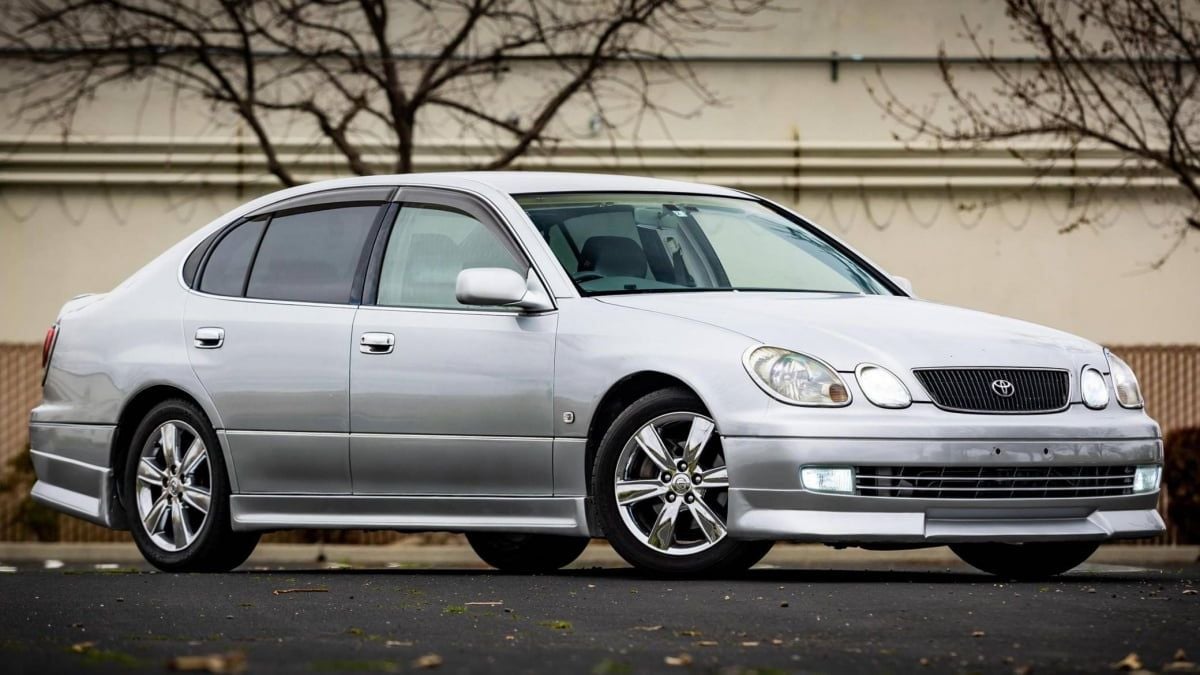We can all agree that the fourth-generation Toyota Supra is one of the most iconic Japanese sports cars of the 1990s. And while beauty is in the eye of the beholder, there is no getting around the fact that the Mk4 Toyota Supra is a 20-plus-year-old Toyota. Unmolested and unmodified examples are getting harder to find, which is why prices are becoming absurd.
There are brand-new cars that can outperform the 1990s Toyota Supra for similar or less money, but I want to pull your attention towards another car. If you want to experience the turbo power of the iconic 2JZ engine at a fraction of the Supra price, the Toyota Aristo is an underrated JDM hero. I am focusing on the second, S16 generation, produced between 1997 and 2005 as it is a more familiar platform outside of Japan.
I think it is of great importance to shed light on underrated, JDM models like the Aristo, since they share the stout mechanics of JDM icons, without being severely overpriced.
Toyota Aristo offers familiar design and proven mechanicals
It's no secret that Toyota's build quality, especially in the 1990s and 2000s is second to none, with the possible exception of Mercedes-Benz models from the same era. Those vehicles are built to last, and the Aristo is no exception. Outside of Japan, the Aristo is known as the Lexus GS and comes with different engine options, among which torquey V-8 engines, including the 1UZ-FE and 3UZ-FE units.
In Japan, the Aristo is offered, exclusively, with the 2JZ-GTE engine. Since this is a JDM model, the Aristo got the non-VVTi version of the iconic inline-six engine. In stock form, the 2JZ is a non-interference engine, meaning if the timing goes bad, there won't be any contact between the pistons and valves.
1997-2005 Toyota Aristo S16 Specifications
- Engine: 3.0-liter, 2JZ-GTE, DOHC, twin-turbo inline-six
- Output: 280 horsepower at 5,600 RPM, 318 pound-feet (432 Nm) at 3,600 RPM
- Transmission: 4-speed automatic, sending power to the rear wheels
- 0-60 MPH: 5.6 seconds
- Curb weight: 3,703 pounds (1,680 kg)
Despite its reliability and tuning potential, Toyota's 2JZ engine is starting to feel outdated compared to some of the newer straight-sixes. Even Chrysler is now offering a potent inline-six, comparable to the best inline-six platforms in the industry.
Moreover, a good-condition 2JZ engine would set you back $4,000 to $5,000, which is more expensive than a whole Toyota Aristo, packing the same turbo inline-six.
There is only one downside to the Toyota Aristo. Since it is a mid-size luxury sedan, it came from the factory, exclusively, with a four-speed automatic – the same one featured in the Mk4 Supra.
Those transmissions are known to top out at around 500 horsepower before they start giving problems. Still, manual conversions are easy to perform, especially since the Getrag V160 manual is mass-produced and found in various Japanese and European models.
Toyota Aristo is a bargain JDM hero
There is an obvious advantage to a car like this being underrated. In Japan, Toyota Aristo prices are very affordable. Even low-mileage examples can easily be found for under $8,000, while those that have been driven a bit more are available for under $3,200. To put things in perspective, Mk4 Toyota Supra prices average $75,223, at the time of writing this article, with the lowest sale recorded by Classic.com being $21,871.
Mind you, people are starting to warm up to the 2JZ-equipped Aristo, and examples like this 1997 Toyota Aristo V300, on Cars and Bids are already going for over $15,000.
One department where the Aristo can't hold a candle to the Mk4 Supra is the sleek looks. It does, however, make up for it with practicality and luxury, while having the potential to be a true sleeper, for a fraction of the Supra price.
By telling you all this, I feel like I am going to ruin the market for these cars thus doing a disservice to petrolheads, looking to buy an affordable, Japanese icon. Sorry!
About the author
Dimitar Angelov's automotive interests made him an expert in a wide variety of vehicles. Japanese brands like Toyota are closest to his heart, although performance cars in general are his favorite segment, which is why he is constantly on the lookout for the best deals on the market. Dimitar Angelov's car passion and knack for the written word led him to complete a Master of Arts in Media and Communications, and classic car restoration. Dim is happy to get behind the wheel of any car and share his impressions. You can follow Dimitar on X, Linked-in, Instagram, and Facebook.





